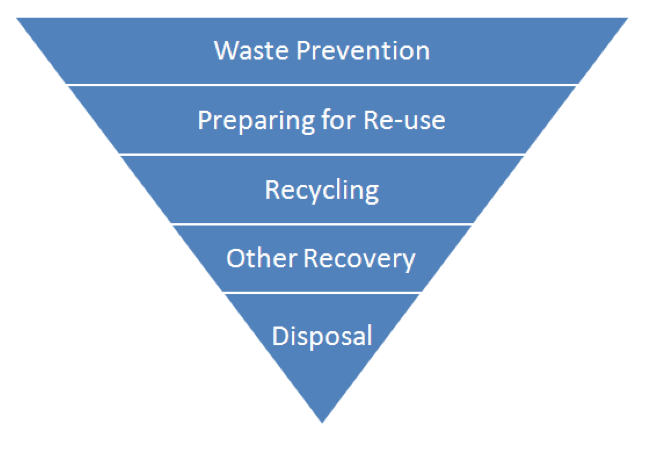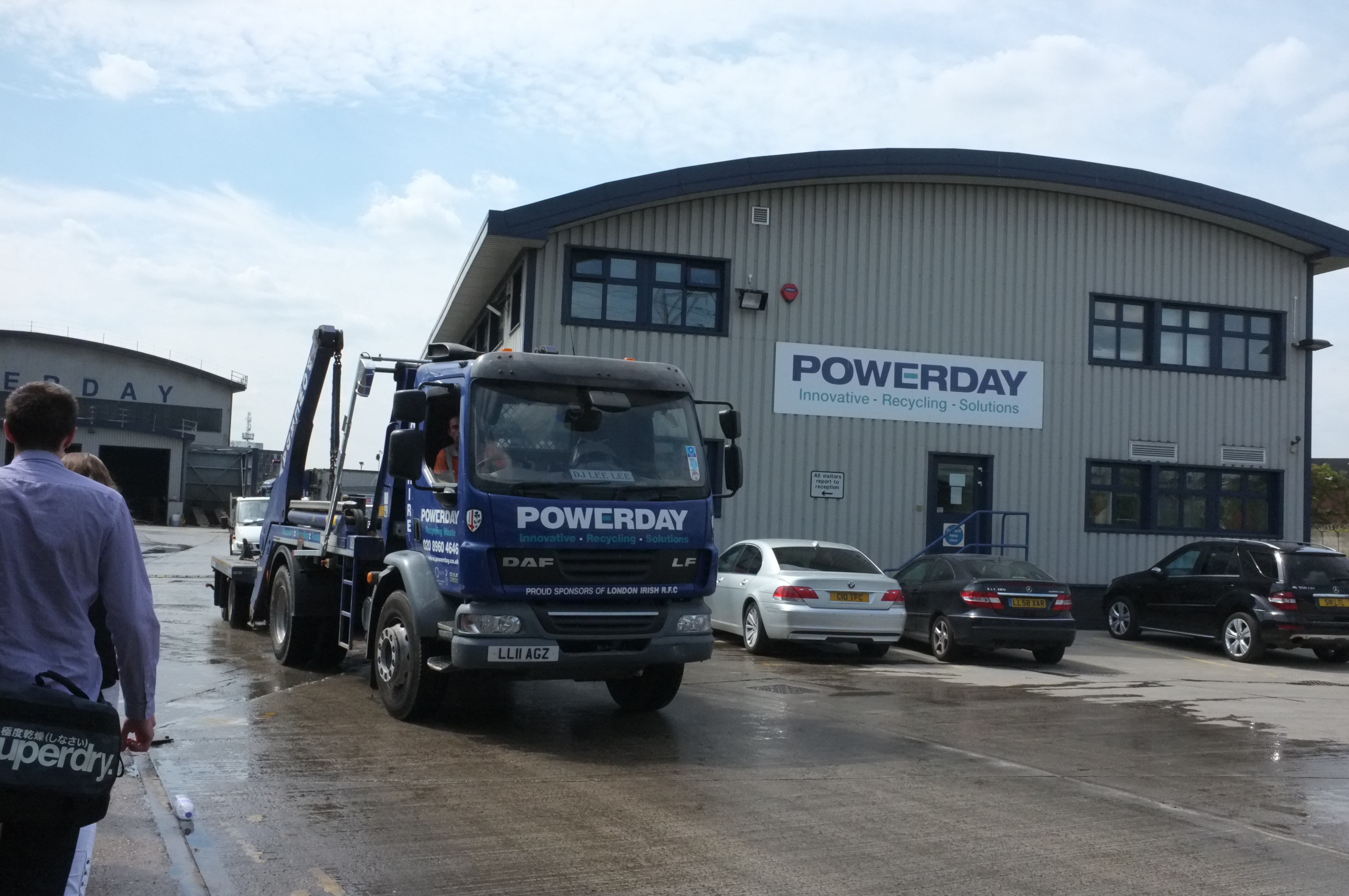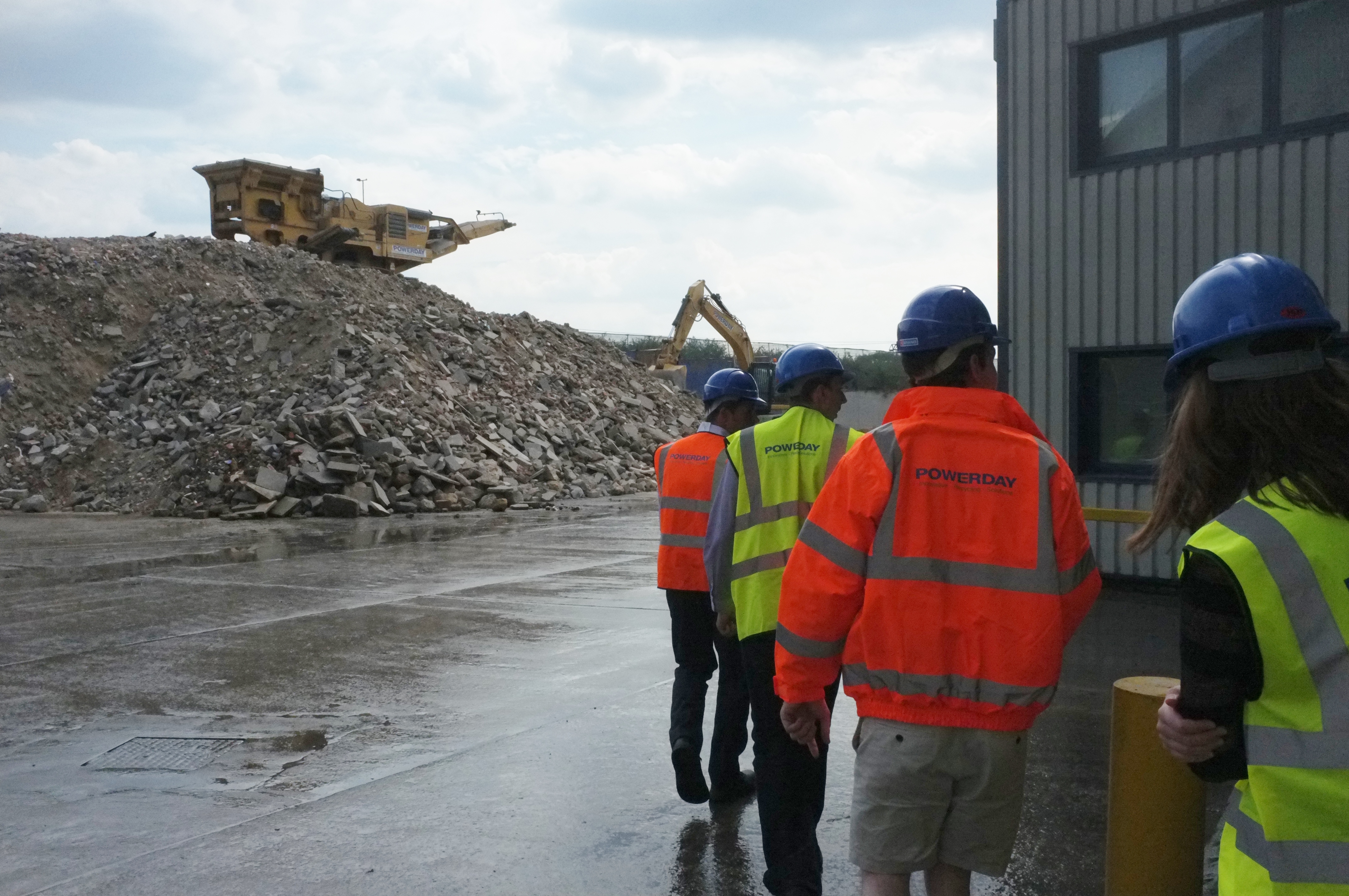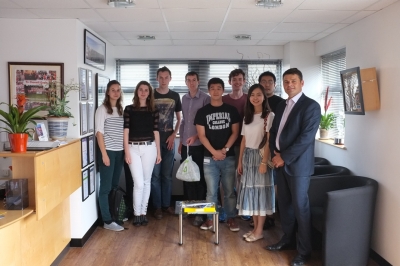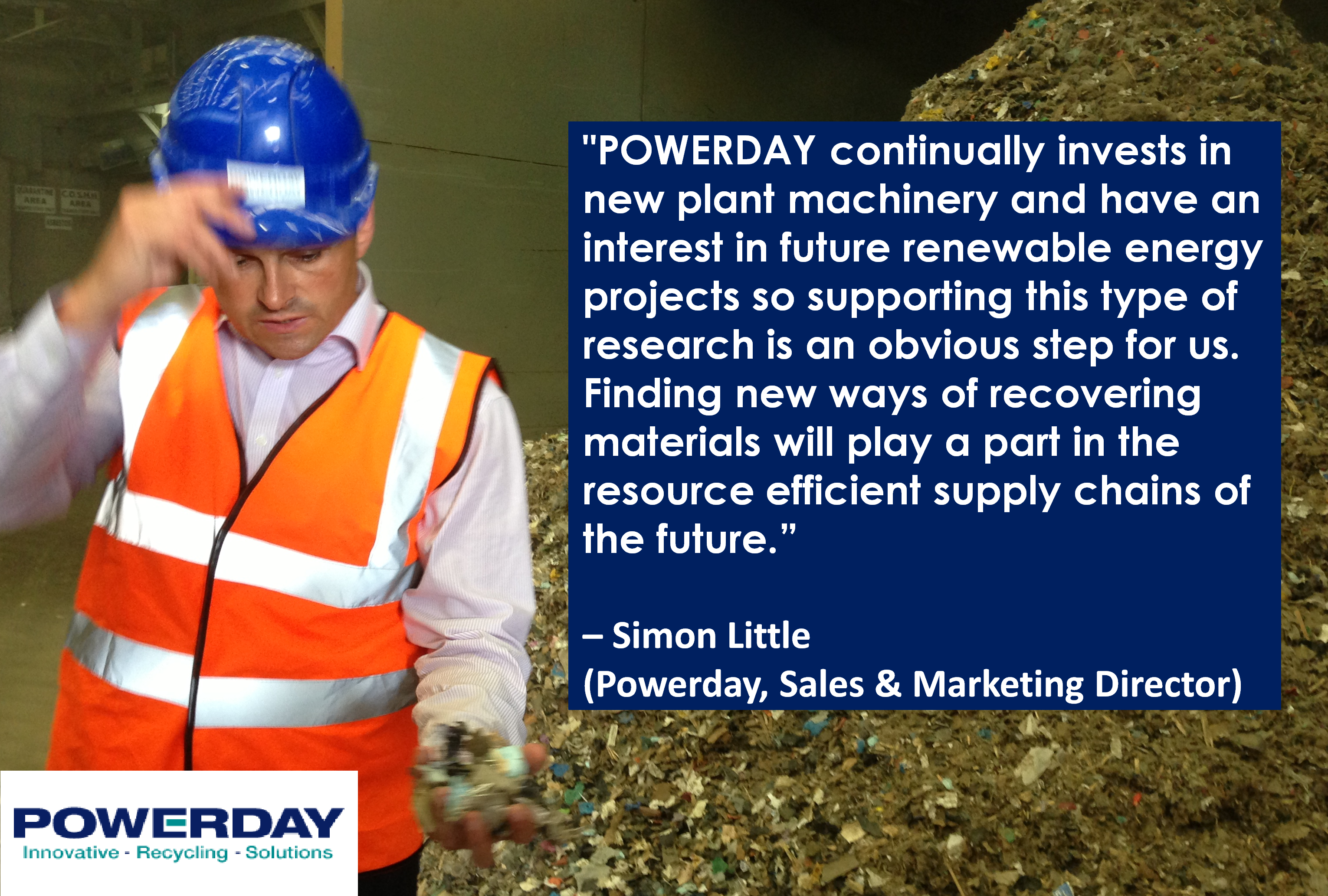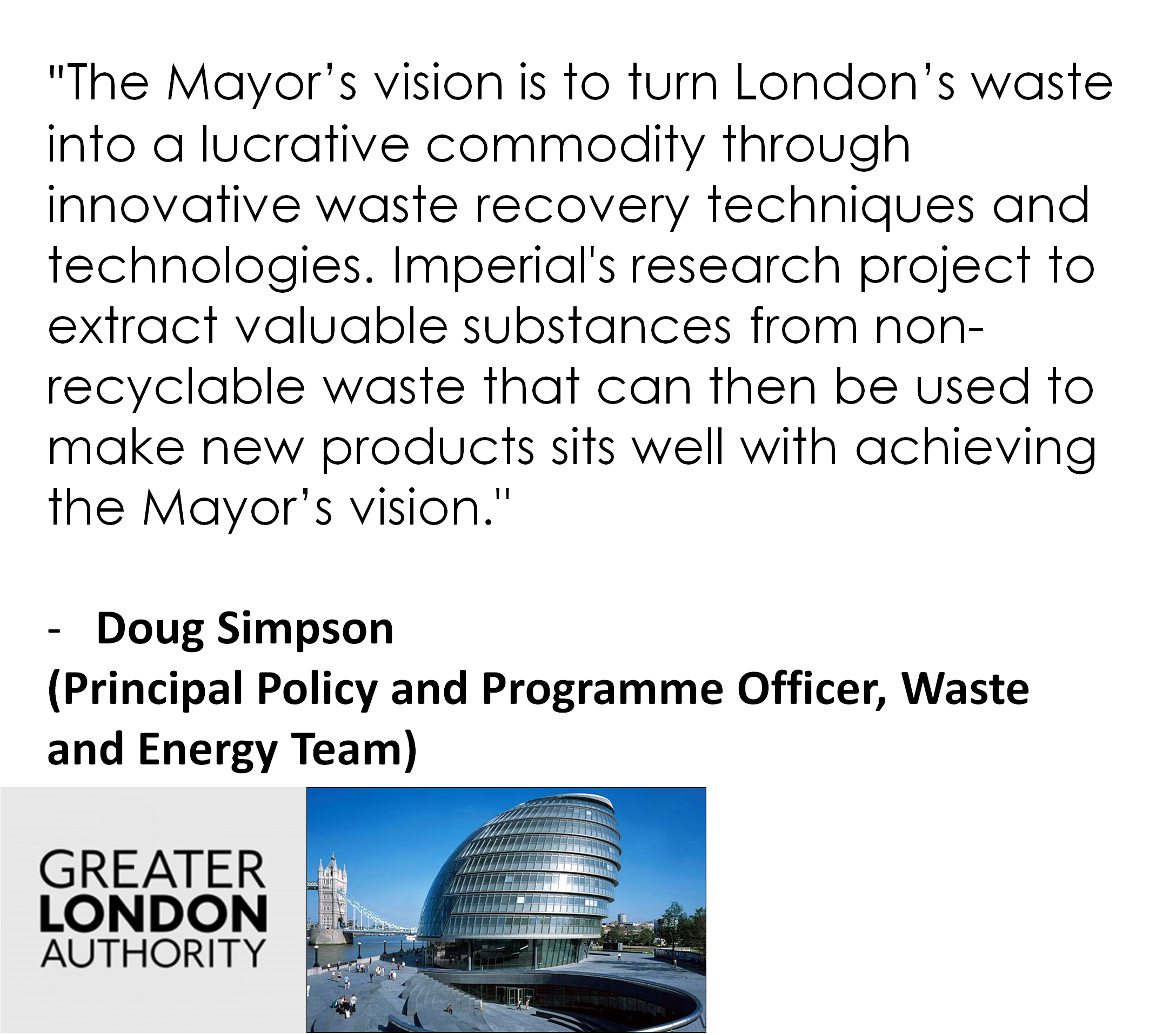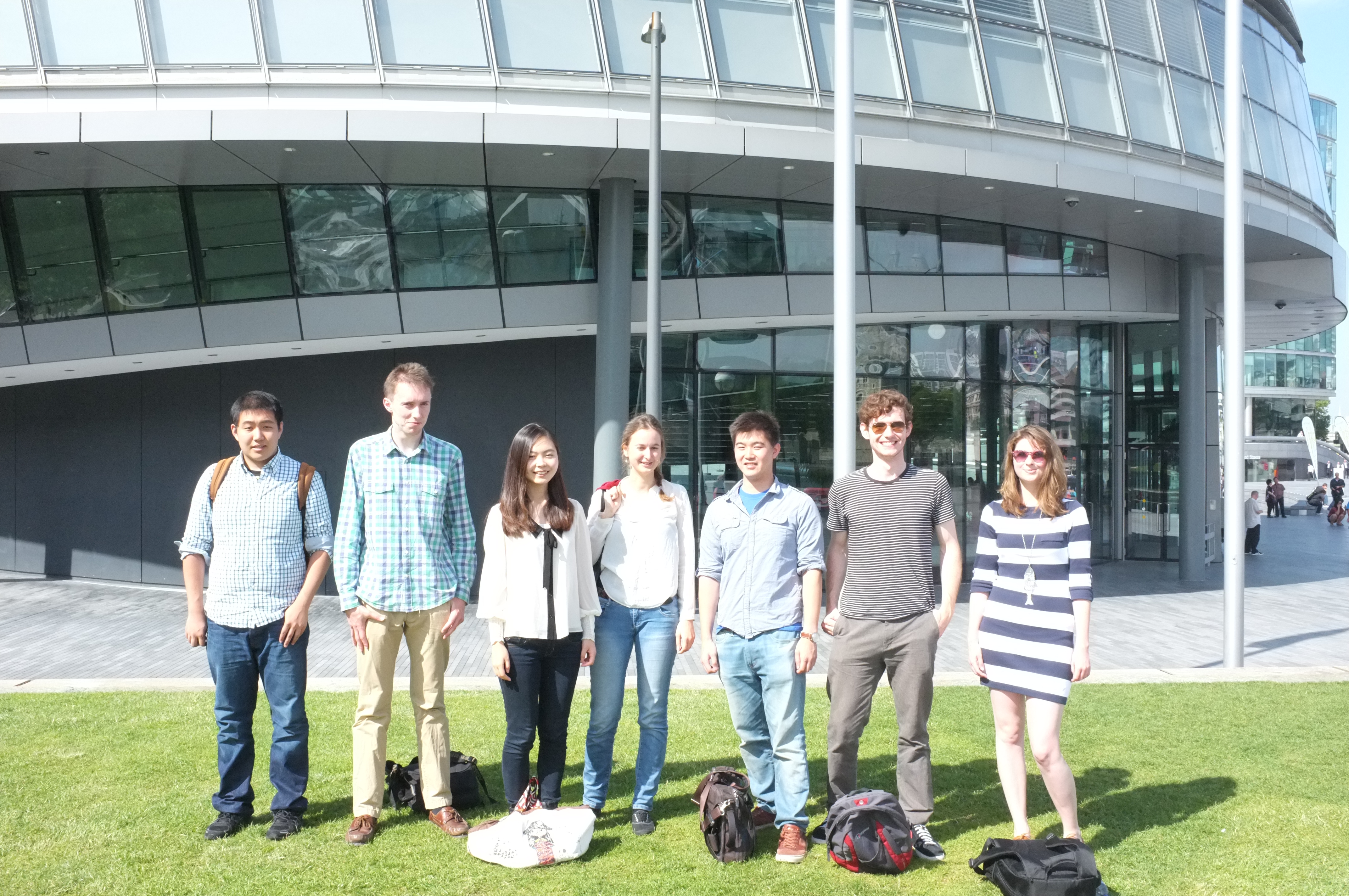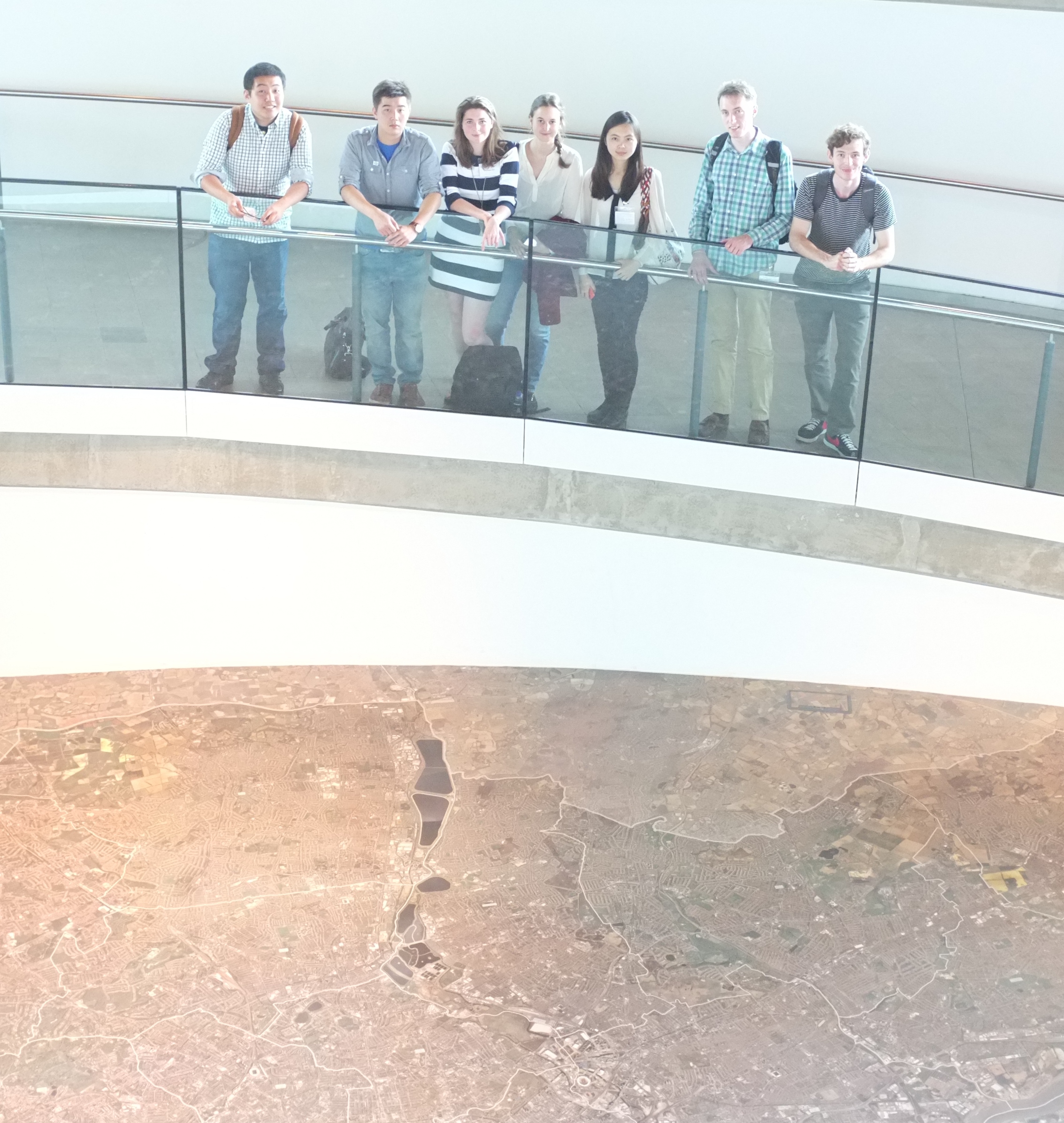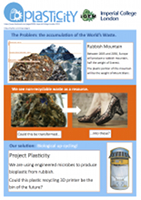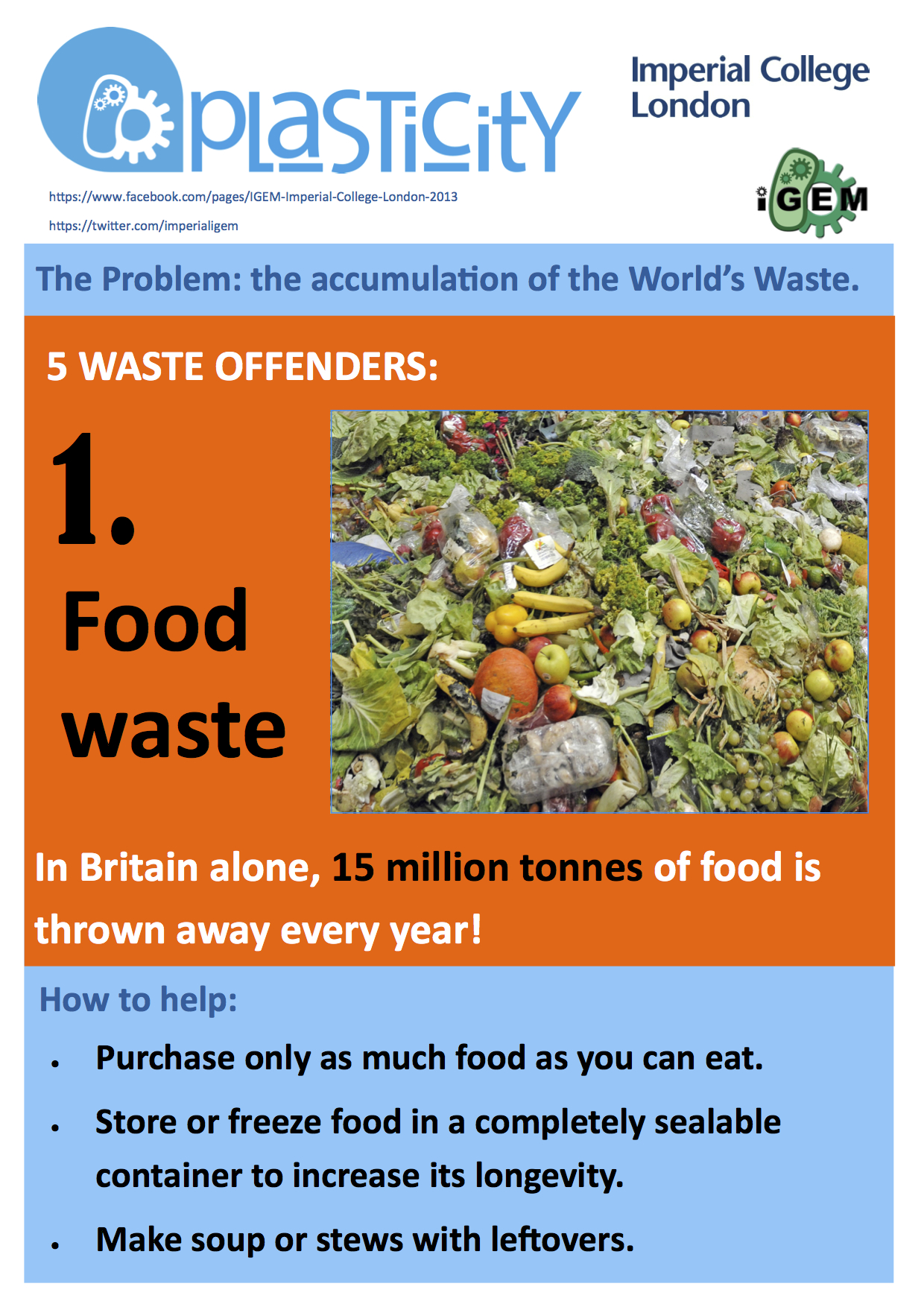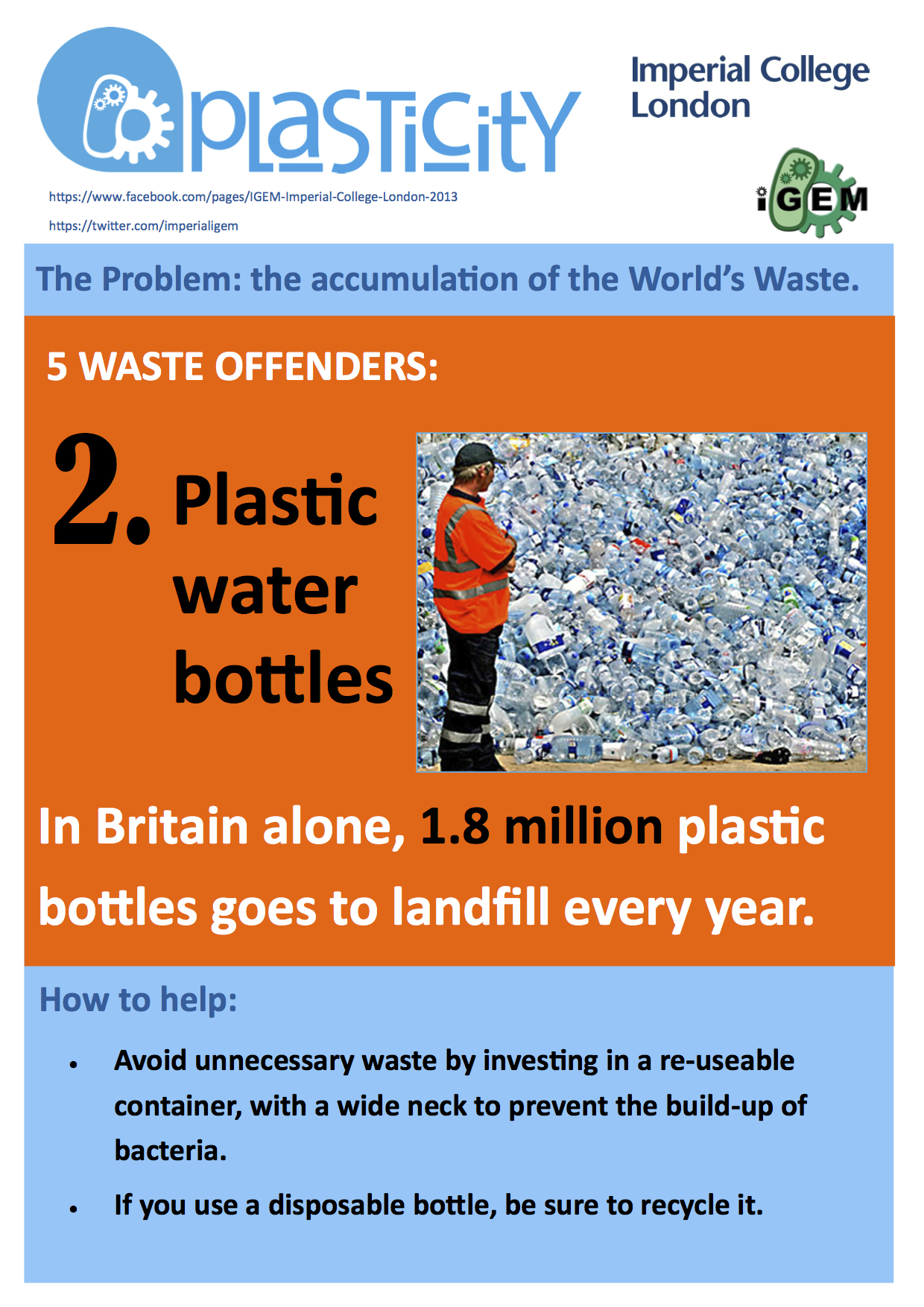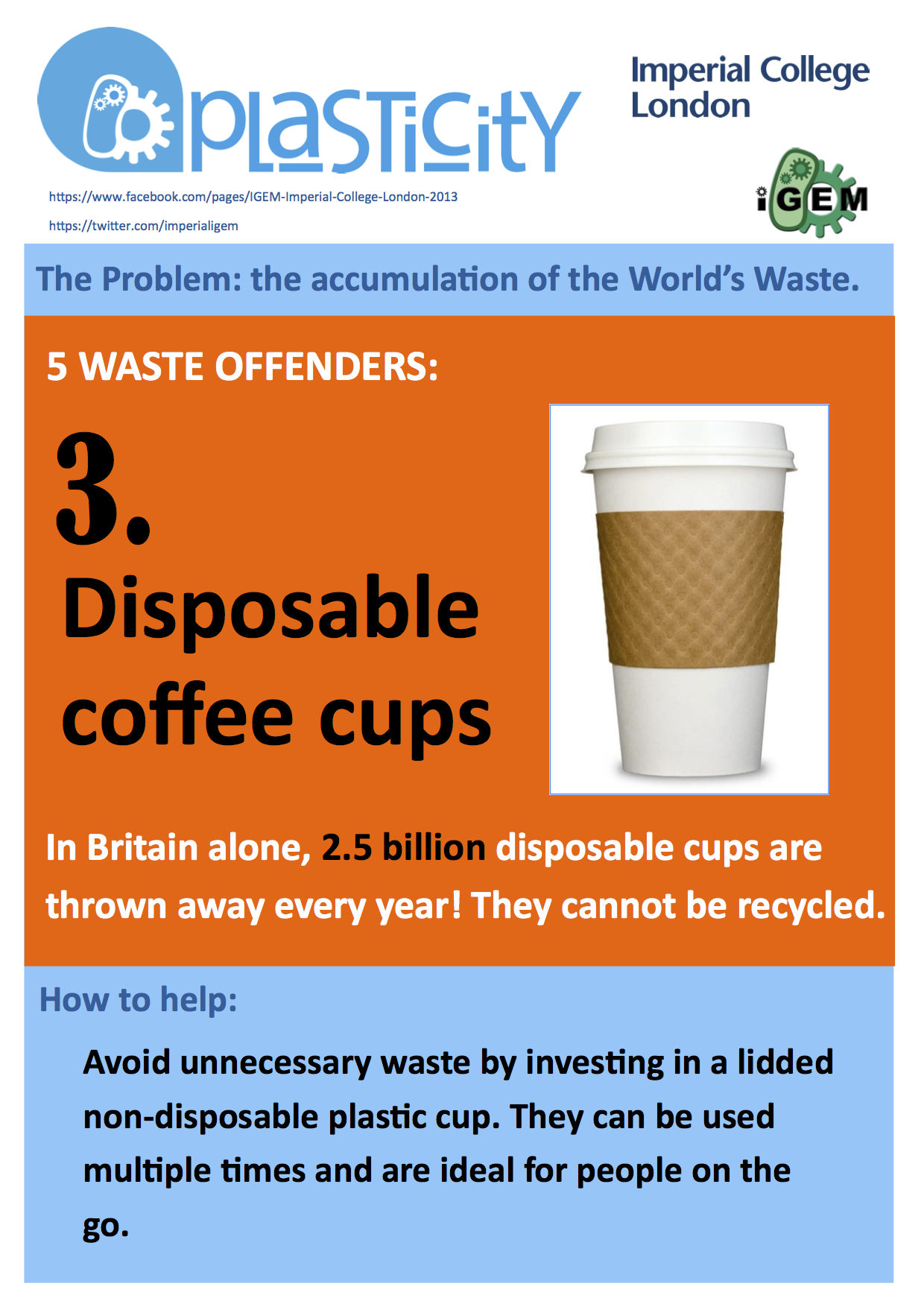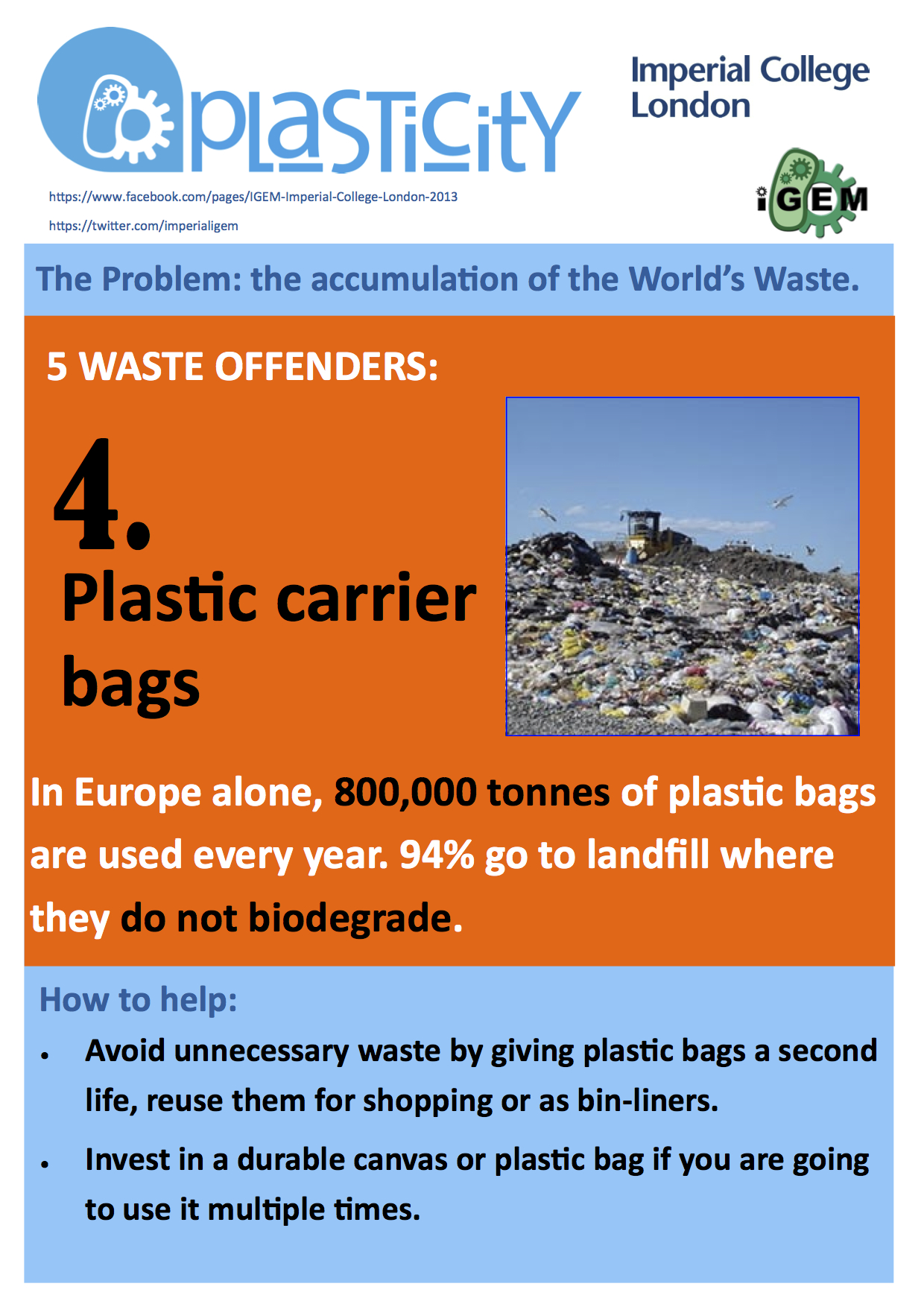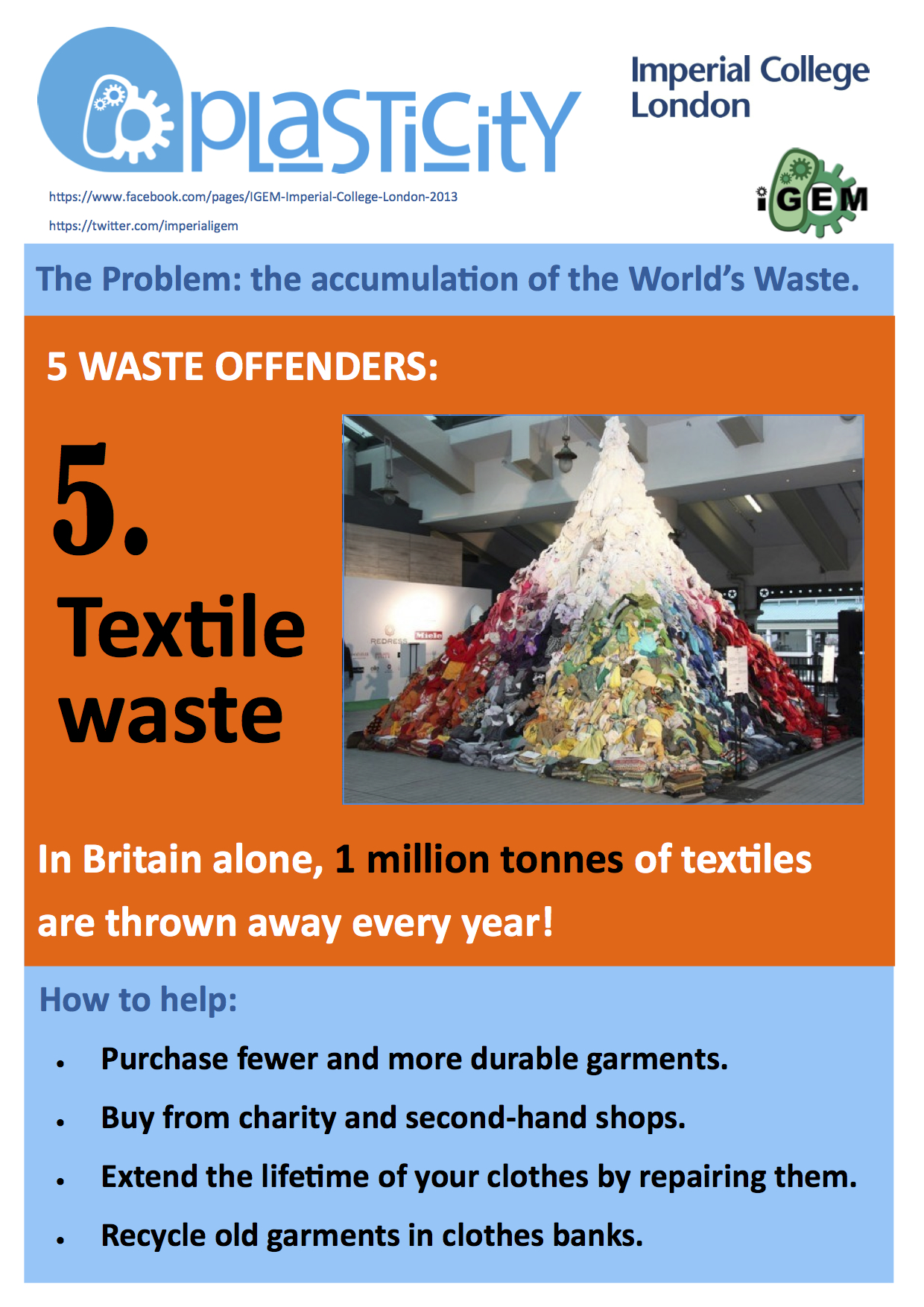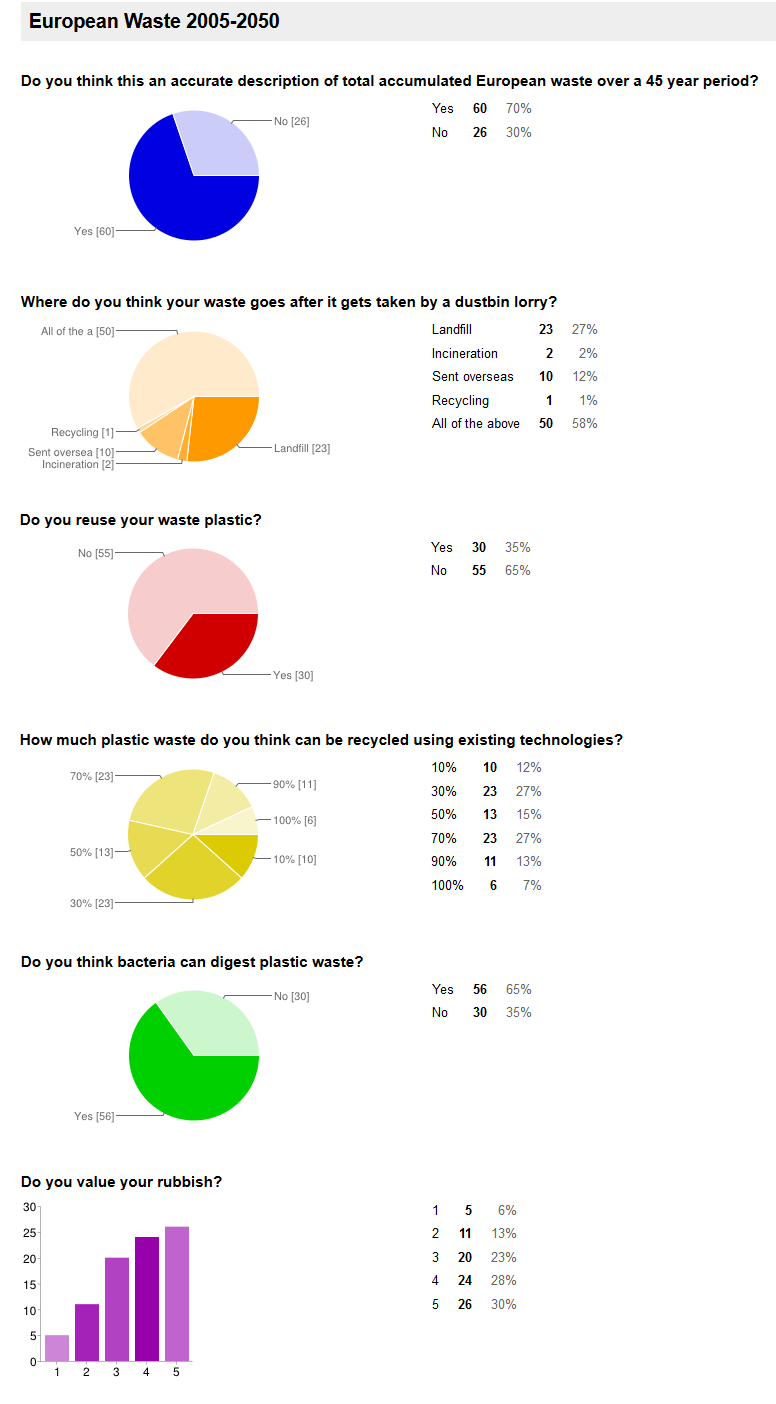Team:Imperial College/Managing Waste
From 2013.igem.org
| (18 intermediate revisions not shown) | |||
| Line 3: | Line 3: | ||
<h1>Managing waste is a both a technological and social challenge</h1> | <h1>Managing waste is a both a technological and social challenge</h1> | ||
| - | <p style="clear: left">Our society faces an extraordinary waste management challenge. It is clear that multiple solutions are needed to address these global challenges with local solutions. Our solution for dealing with waste is a technological one. It aims to reduce the harmful impacts that incineration and landfilling have on our environment and also to retain the resources locked up in the waste in a useable form. However, it is clear that we should not be relying on after-the-event solutions to try to solve problems which are caused to a large extent by the choices we make. The waste hierarchy shown below indicates the decreasing dependence we should place on subsequent steps in our bid to reduce waste. </p> [[File:WasteHierarchy.png|thumbnail| | + | <p style="clear: left">Our society faces an extraordinary waste management challenge. It is clear that multiple solutions are needed to address these global challenges with local solutions. Our solution for dealing with waste is a technological one. It aims to reduce the harmful impacts that incineration and landfilling have on our environment and also to retain the resources locked up in the waste in a useable form. However, it is clear that we should not be relying on after-the-event solutions to try to solve problems which are caused to a large extent by the choices we make. The waste hierarchy shown below indicates the decreasing dependence we should place on subsequent steps in our bid to reduce waste. </p> [[File:WasteHierarchy.png|thumbnail|left|400px|The waste hierarchy of the EU, Directive 2008/98]] |
| + | <br><br><br><br><br><br><br><br><br><br><br><br><br><br><br> | ||
<h2>Powerday Recycling Centre Visit</h2> | <h2>Powerday Recycling Centre Visit</h2> | ||
| Line 10: | Line 11: | ||
[[File:Powerday.JPG|325px]] | [[File:Powerday.JPG|325px]] | ||
| - | [[File: | + | [[File:POWERDAY VISIT.JPG|295px]] |
[[File:ICLvisit080813-400x266.jpg|325px]] | [[File:ICLvisit080813-400x266.jpg|325px]] | ||
| + | <br><br> | ||
| + | [[File:Simonlittle.png|left|600px]] | ||
| + | "It was really interesting to meet the students and hear the outline of their project and I hope the visit to our Materials Recycling Facility gave the project team an insight to how materials are handled today. The waste and resource management sector is in a period of unprecedented change and so is a fertile ground for innovation and I look forward to seeing how this project develops. POWERDAY continually invests in new plant machinery and have an interest in future renewable energy projects so supporting this type of research is an obvious step for us. Finding new ways of recovering materials will play a part in the resource efficient supply chains of the future". <b>Simon Little (Powerday, Sales & Marketing Director)</b> | ||
| - | |||
Our visit also featured on the Powerday corporate website [http://www.powerday.co.uk/news/imperial-college-london-students-visit-powerday Imperial college students visit Powerday] and on their twitter account @PowerdayPLC | Our visit also featured on the Powerday corporate website [http://www.powerday.co.uk/news/imperial-college-london-students-visit-powerday Imperial college students visit Powerday] and on their twitter account @PowerdayPLC | ||
| Line 20: | Line 23: | ||
<h2>City Hall Meeting</h2> | <h2>City Hall Meeting</h2> | ||
| - | We visited local government, the Greater London Authority (GLA) at [http://www.london.gov.uk/city-hall/ City Hall]. City Hall is located between London Bridge and Tower Bridge, on the south bank of the Thames. We spoke to Doug Simpson (Principal Policy and Programme Officer, Waste and Energy Team) about our project and more generally about waste management issues for London and the UK. The feedback about our project was incredibly positive and we gained an incredible insight into government perspectives on waste management which have directly shaped our project. | + | We visited local government, the Greater London Authority (GLA) at [http://www.london.gov.uk/city-hall/ City Hall]. City Hall is located between London Bridge and Tower Bridge, on the south bank of the Thames. We spoke to Doug Simpson (Principal Policy and Programme Officer, Waste and Energy Team) about our project and more generally about waste management issues for London and the UK. The feedback about our project was incredibly positive and we gained an incredible <b>insight into government perspectives on waste management which have directly shaped our project.</b> |
| + | |||
| + | [[File:Gla quote.png|left|600px]] | ||
| + | [[File:Imperialcityhall.JPG|right|350px]][[File:Inside_cityhall.JPG|right|350px]] | ||
| + | |||
| + | <br><br><br><br><br><br><br><br> | ||
| + | <br><br><br><br><br><br><br><br><br><br><br><br> | ||
| + | <br><br><br><br><br><br> | ||
| - | |||
| - | |||
| - | |||
<h2>Human Practices Panel</h2> | <h2>Human Practices Panel</h2> | ||
| - | We assembled a panel of experts | + | <p>We assembled a panel of experts in order to understand our project better as well as improve our project. These experts are:</p> |
| + | <ul> | ||
| + | <li>Prof. Paul Freemont (Co-founder and co-director of the [http://www3.imperial.ac.uk/syntheticbiology Centre for Synthetic Biology and Innovation])</li> | ||
| + | <li>Prof. Richard Kitney (Co-founder and co-director of the Centre for Synthetic Biology and Innovation)</li> | ||
| + | <li>Prof. Christopher Cheeseman (Expert in waste management and sustainable use of materials)</li> | ||
| + | <li>Dr. Catherine Jefferson (Expert in Conflict and security, biotechnology and public policy)</li> | ||
| + | <li>Dr. Ed Marshall (Co-founder and Head of Research at Plaxica, a bioplastics production company)</li> | ||
| + | <li>Dr. Karen Polizzi (Expert in bioreactors)</li> | ||
| + | </ul> | ||
| + | <p>We discussed at length the core societal, ethical and technological challenges surrounding our project, as well as broader aspects about the future of bioplastics, recycling and synthetic biology. Our panel discussion framed our perspectives on how we could communicate that waste is a valuable resource and whether synthetic biology is an appropriate waste management technology. We also thought about the safety implications of how our technology would be [https://2013.igem.org/Team:Imperial_College/Industrial_Implementation industrially implemented].</p> | ||
| - | + | <html> | |
| + | <iframe width="420" height="315" src="//www.youtube-nocookie.com/embed/zkICikgoNJY?rel=0" frameborder="0" allowfullscreen></iframe> | ||
| + | </html> | ||
| - | + | <p>Through this panel discussion, we realised that contaminated and mixed waste are huge challenges we are facing, and we need new technology to build on current infrastructure, in order to achieve sustainable use of materials. After this panel, we conducted an [https://2013.igem.org/Team:Imperial_College/Managing_Waste#Waste_5_minutes_of_your_time_Quiz online quiz] to understand public perception about waste. In order to engage more people, we created [https://static.igem.org/mediawiki/2013/d/d6/Homebrew.pdf homebrew M.A.P.L.E. system], allowing people to make their own bioplastic product. As we have successfully proved P3HB produced from the waste we collected from recycling plant can be degraded by our part, we are confident that our technology will be able to transform people’s perception of waste. </p> | |
<h2>Recycling Posters</h2> | <h2>Recycling Posters</h2> | ||
| - | <p> To help raise awareness of our project and at the same time promote recycling awareness we decided to create these posters. Our posters also featured on the [https://2013.igem.org/Community iGEM community] page. Click on the posters to download a PDF version. | + | <p> To help raise awareness of our project and at the same time promote recycling awareness we decided to create these posters. Our posters also featured on the [https://2013.igem.org/Community iGEM community] page. Click on the posters to download a PDF version. </p> |
[[File:Project overview poster.jpg|left|link=https://static.igem.org/mediawiki/2013/c/ca/Project_overview_poster.pdf|150px]] | [[File:Project overview poster.jpg|left|link=https://static.igem.org/mediawiki/2013/c/ca/Project_overview_poster.pdf|150px]] | ||
[[File:5_offenders_food.jpg|left|link=https://static.igem.org/mediawiki/2013/3/33/5_offenders_food.pdf|150px]] | [[File:5_offenders_food.jpg|left|link=https://static.igem.org/mediawiki/2013/3/33/5_offenders_food.pdf|150px]] | ||
| Line 43: | Line 61: | ||
[[File:5_offenders_bags.jpg|left|link=https://static.igem.org/mediawiki/2013/2/2f/5_offenders_bags.pdf|150px]] | [[File:5_offenders_bags.jpg|left|link=https://static.igem.org/mediawiki/2013/2/2f/5_offenders_bags.pdf|150px]] | ||
[[File:5_offenders_textile.jpg|left|link=https://static.igem.org/mediawiki/2013/c/c0/5_offenders_textile.pdf|150px]] | [[File:5_offenders_textile.jpg|left|link=https://static.igem.org/mediawiki/2013/c/c0/5_offenders_textile.pdf|150px]] | ||
| - | + | <br><br><br><br><br><br><br><br><br><br><br> | |
| - | <br><br> | + | |
| - | <br> | + | |
<h2>Engaging with waste management stakeholders</h2> | <h2>Engaging with waste management stakeholders</h2> | ||
Latest revision as of 15:53, 26 October 2013
Contents |
Managing waste is a both a technological and social challenge
Our society faces an extraordinary waste management challenge. It is clear that multiple solutions are needed to address these global challenges with local solutions. Our solution for dealing with waste is a technological one. It aims to reduce the harmful impacts that incineration and landfilling have on our environment and also to retain the resources locked up in the waste in a useable form. However, it is clear that we should not be relying on after-the-event solutions to try to solve problems which are caused to a large extent by the choices we make. The waste hierarchy shown below indicates the decreasing dependence we should place on subsequent steps in our bid to reduce waste.
Powerday Recycling Centre Visit
We visited Powerday recovery centre in west London. Powerday is a family owned recycling and waste management company founded in 1980. Simon Little (Powerday, Sales & Marketing Director) gave us a tour of the site and provided an insight into the UK waste management industry. During our visit we identified a source of non-recyclable waste, termed solid recovered fuel (SRF) which we have used in our experiments.
"It was really interesting to meet the students and hear the outline of their project and I hope the visit to our Materials Recycling Facility gave the project team an insight to how materials are handled today. The waste and resource management sector is in a period of unprecedented change and so is a fertile ground for innovation and I look forward to seeing how this project develops. POWERDAY continually invests in new plant machinery and have an interest in future renewable energy projects so supporting this type of research is an obvious step for us. Finding new ways of recovering materials will play a part in the resource efficient supply chains of the future". Simon Little (Powerday, Sales & Marketing Director)
Our visit also featured on the Powerday corporate website [http://www.powerday.co.uk/news/imperial-college-london-students-visit-powerday Imperial college students visit Powerday] and on their twitter account @PowerdayPLC
City Hall Meeting
We visited local government, the Greater London Authority (GLA) at [http://www.london.gov.uk/city-hall/ City Hall]. City Hall is located between London Bridge and Tower Bridge, on the south bank of the Thames. We spoke to Doug Simpson (Principal Policy and Programme Officer, Waste and Energy Team) about our project and more generally about waste management issues for London and the UK. The feedback about our project was incredibly positive and we gained an incredible insight into government perspectives on waste management which have directly shaped our project.
Human Practices Panel
We assembled a panel of experts in order to understand our project better as well as improve our project. These experts are:
- Prof. Paul Freemont (Co-founder and co-director of the [http://www3.imperial.ac.uk/syntheticbiology Centre for Synthetic Biology and Innovation])
- Prof. Richard Kitney (Co-founder and co-director of the Centre for Synthetic Biology and Innovation)
- Prof. Christopher Cheeseman (Expert in waste management and sustainable use of materials)
- Dr. Catherine Jefferson (Expert in Conflict and security, biotechnology and public policy)
- Dr. Ed Marshall (Co-founder and Head of Research at Plaxica, a bioplastics production company)
- Dr. Karen Polizzi (Expert in bioreactors)
We discussed at length the core societal, ethical and technological challenges surrounding our project, as well as broader aspects about the future of bioplastics, recycling and synthetic biology. Our panel discussion framed our perspectives on how we could communicate that waste is a valuable resource and whether synthetic biology is an appropriate waste management technology. We also thought about the safety implications of how our technology would be industrially implemented.
Through this panel discussion, we realised that contaminated and mixed waste are huge challenges we are facing, and we need new technology to build on current infrastructure, in order to achieve sustainable use of materials. After this panel, we conducted an online quiz to understand public perception about waste. In order to engage more people, we created homebrew M.A.P.L.E. system, allowing people to make their own bioplastic product. As we have successfully proved P3HB produced from the waste we collected from recycling plant can be degraded by our part, we are confident that our technology will be able to transform people’s perception of waste.
Recycling Posters
To help raise awareness of our project and at the same time promote recycling awareness we decided to create these posters. Our posters also featured on the iGEM community page. Click on the posters to download a PDF version.
Engaging with waste management stakeholders
Our team communicated with an array of individuals and organisations that are critical of synthetic biology, but supportive of increased recycling and the development of a more sustainable society. From our interactions we learned that waste management is a social as well as a technological issue. These discussions gave us the idea to promote our project across Imperial in a novel way, our posters became fun recycling awareness posters (as featured on the iGEM community page).

"I believe that by the end of this century we will be able to mine our landfills and use their contents..." [http://www.greentechforum.net/green-technology-forum/2013/3/25/waste-doesnt-have-to-be-wasted-1.html Green Technology Forum]
"Nem feltétlenül igaz tehát az az elkeserítő jövőkép, amelyben minden eláraszt a műanyag szemét. Remélhetőleg a közeljövőben a műanyaggyártás egyre nagyobb mértékben átáll a komposztálható műanyagok előállítására, a már meglevő szemét eltüntetésére pedig hatékony és környezetkímélő módszereket sikerül kidolgozni." [http://criticalbiomass.blog.hu/2013/09/06/mert_ez_mu-anyag Critical Biomass]
Waste 5 minutes of your time Quiz
Whilst surveys can be a waste of time because it is difficult to get a true representative cohort, we still thought it would be useful to get some idea about whether people value waste. Therefore we put together a Quiz and sent the link throughout our social media networks. 86 people responded.
 "
"




